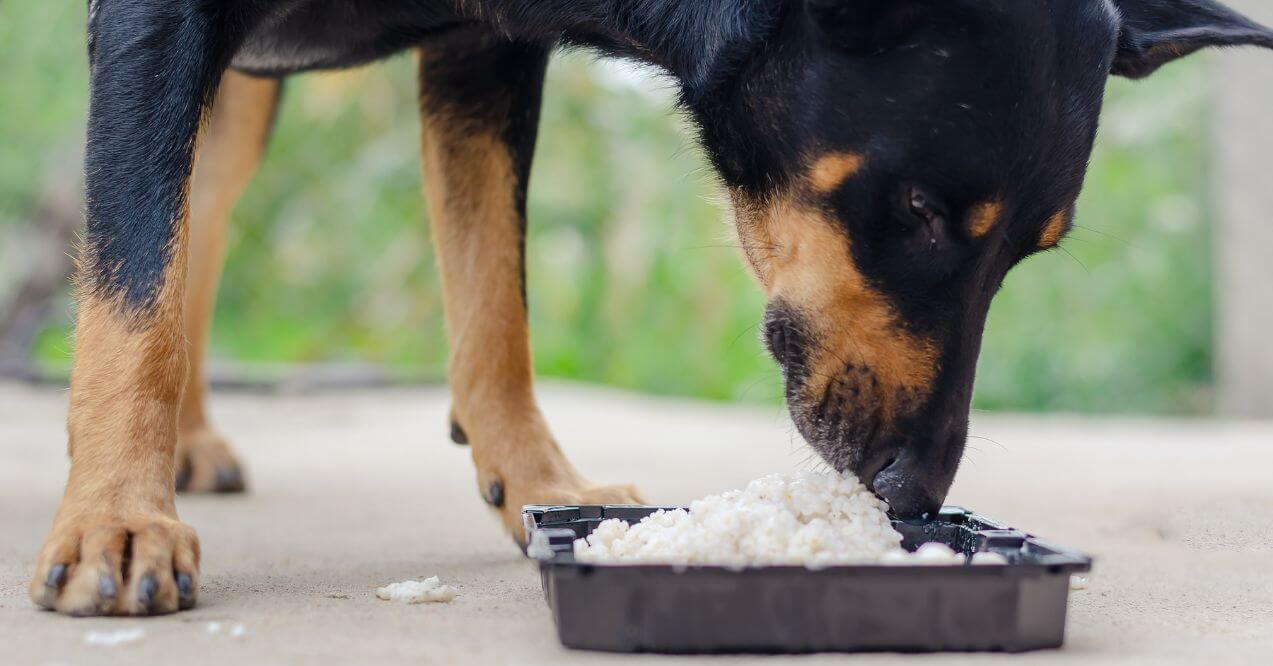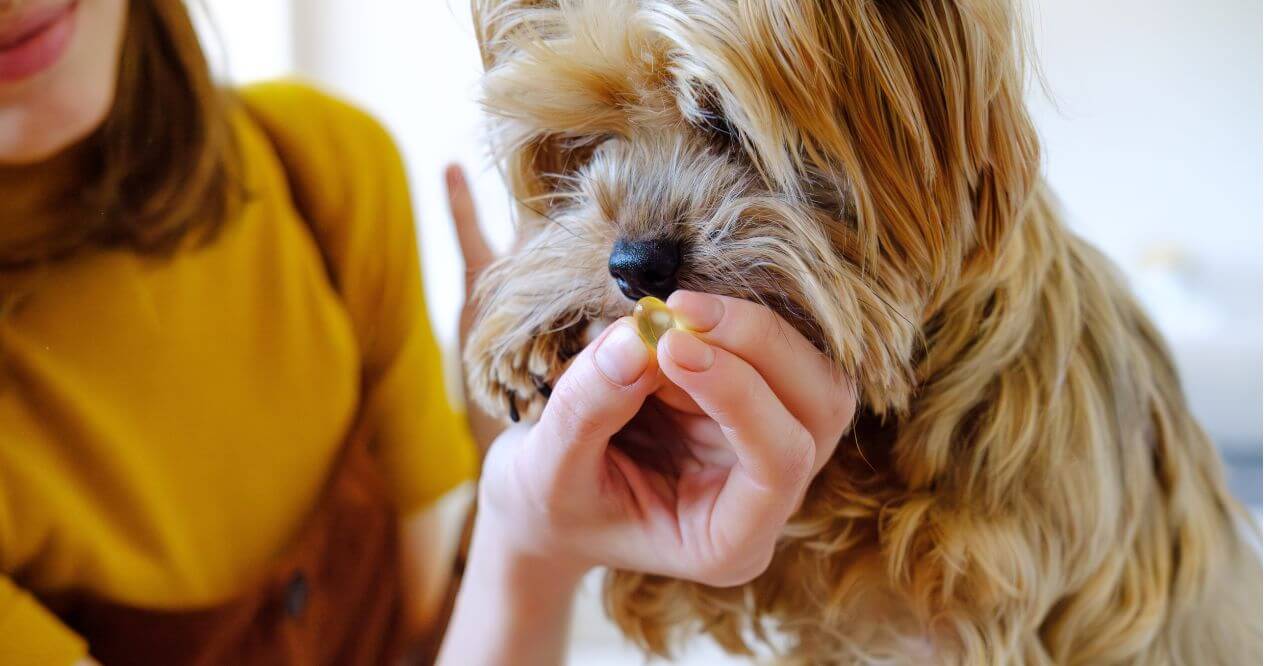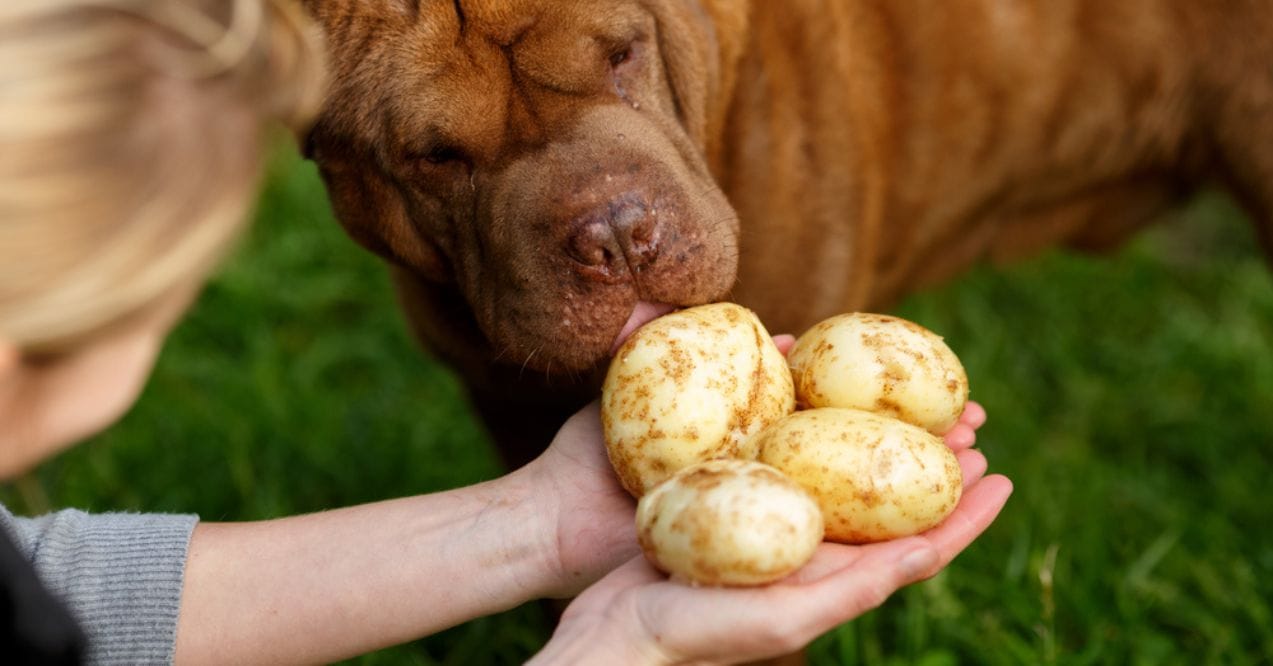Can Dogs Have Rice?
Can dogs have rice? In short, yes. When served properly, rice can be a valuable addition to your dog’s diet. This staple grain is commonly found in commercial dog foods and provides essential carbohydrates that support energy levels and digestive health. In this blog, we’ll explore the benefits and considerations of feeding rice to your dog, with a focus on different varieties like brown, white, and jasmine rice. Understanding how these types of rice can fit into your dog’s nutritional plan will help you make informed choices that promote their overall well-being.
Can Dogs Eat Rice?
Can dogs have rice? As we mentioned before – absolutely. Dogs have evolved to digest grains like rice, which can be a beneficial part of their diet. Rice, compared to other grains, is highly digestible and provides an excellent source of carbohydrates, which are essential for energy. It also contains fiber, supporting digestive health, and offers key vitamins and minerals like magnesium, B vitamins, and manganese, which contribute to overall well-being.
Brown rice, known for its higher fiber content, is ideal for promoting digestive regularity and providing long-lasting energy. White rice, on the other hand, is easier to digest and often recommended when dogs need a simple carbohydrate source that’s gentle on the stomach. Jasmine rice, a fragrant variety, shares similar digestibility to white rice but also contains small amounts of fiber and nutrients that support a balanced diet.
Benefits of Rice for Dogs
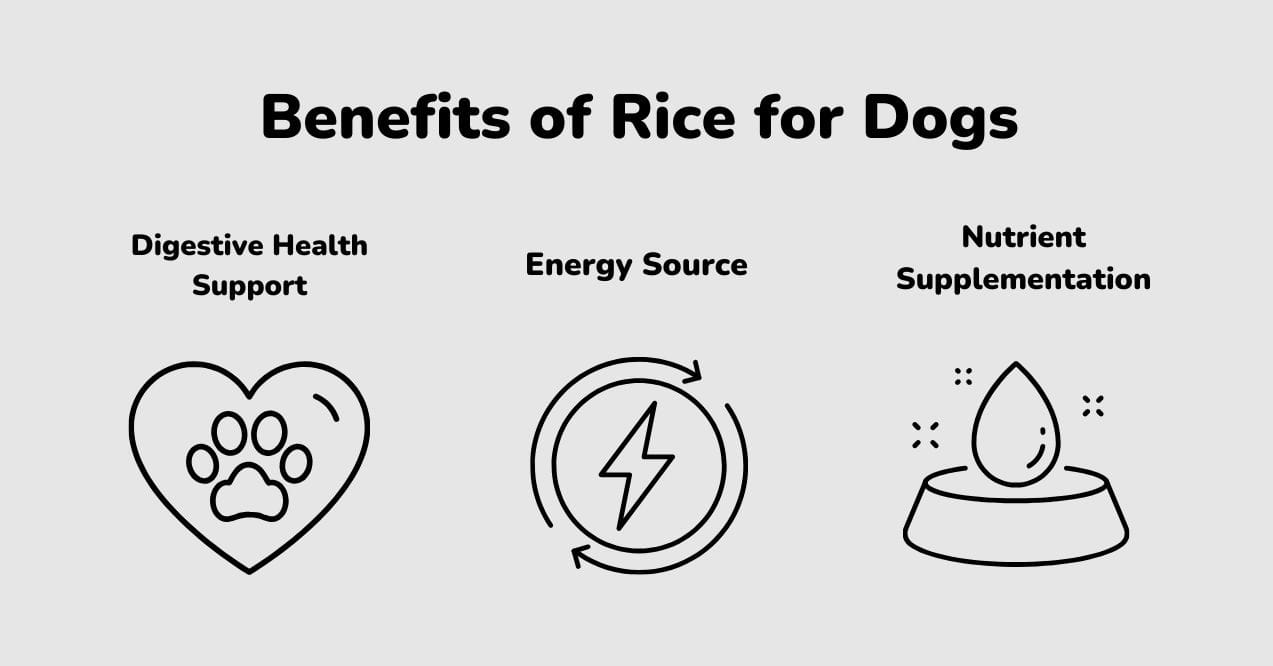
Rice offers several benefits for dogs, making it a versatile addition to their diet. From supporting digestive health to providing a steady source of energy, rice can be a valuable component in maintaining your dog’s overall well-being.
Digestive Health Support
Rice is often used to help soothe upset stomachs and can firm up loose stools, making it a go-to option for dogs with digestive issues. Its bland nature is easy on the stomach, and it’s commonly included in elimination diets to identify food sensitivities, offering a simple yet effective way to support digestive health.
Energy Source
The carbohydrates in rice provide a quick and easily accessible source of energy, which is especially beneficial for active or working dogs. For underweight dogs or those needing extra calories, rice can be a useful supplement, helping to maintain or increase energy levels without adding too much fat to their diet.
Nutrient Supplementation
Rice contains essential vitamins and minerals such as B vitamins, magnesium, and manganese. These nutrients contribute to overall health, supporting processes like energy metabolism and bone health. Additionally, rice can help balance homemade dog food recipes, offering a nutritious base that may also benefit skin and coat health when included as part of a balanced diet.
Can Dogs Have Brown Rice?
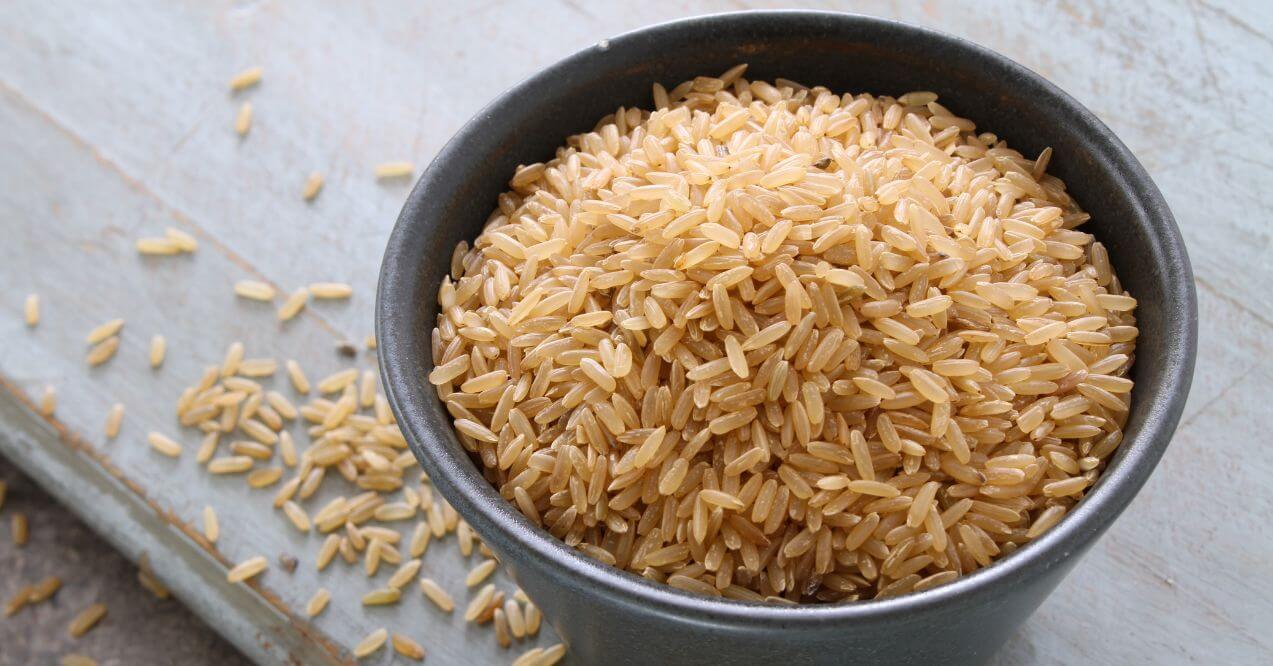
Can dogs have brown rice? Yes, and it can offer several nutritional benefits when included in their diet. Unlike white rice, brown rice retains the bran layer, making it higher in fiber, which supports digestive health but can also make it a bit harder to digest for some dogs. For those wondering, is brown rice good for dogs? It can be a valuable addition, particularly for dogs with specific dietary needs, such as those needing to manage weight or support heart health.
The fiber in brown rice, particularly insoluble fiber, helps promote healthy digestion by encouraging regular bowel movements. Additionally, its lower glycemic index allows for a gradual release of energy, which can be helpful for active dogs or those needing sustained energy throughout the day. However, brown rice should be served in moderation, as it may be harder for some dogs to digest.
It’s important to note that when preparing brown rice for dogs, ensure it’s thoroughly cooked to improve digestibility and reduce any potential concerns, such as arsenic content.
Can Dogs Have White Rice?
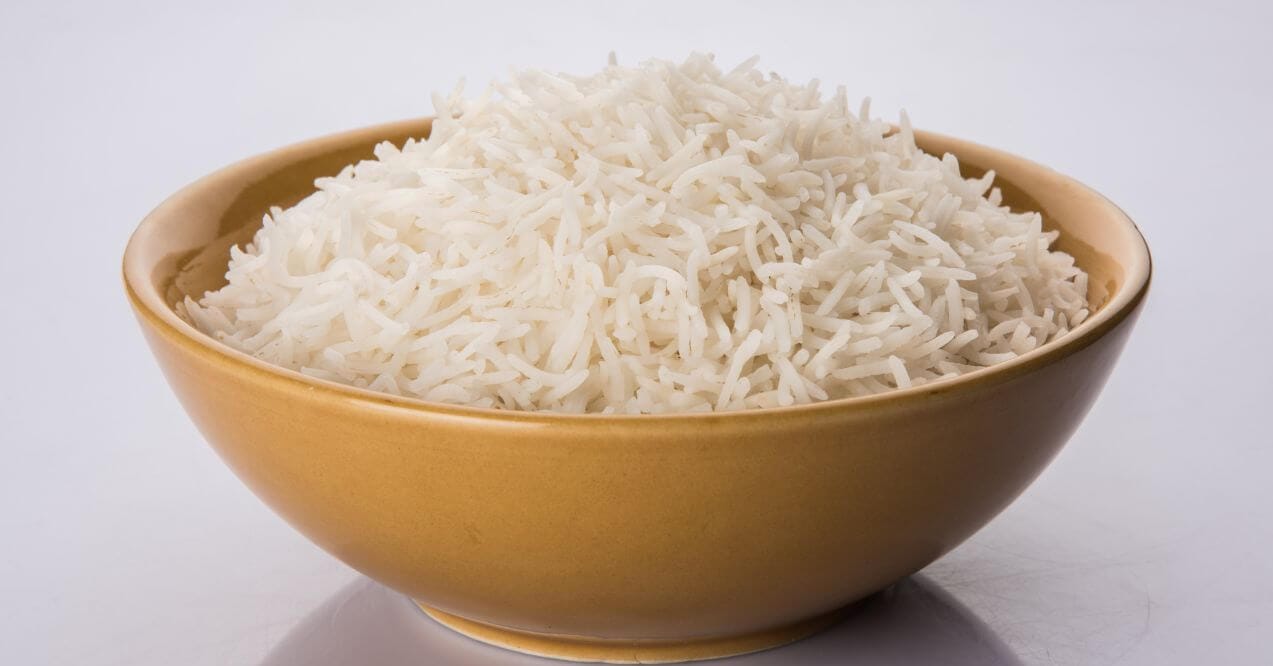
For those wondering, can dogs have white rice, the answer is also yes. However, white rice is often recommended for dogs experiencing digestive issues. It is a simple carbohydrate that is easy for dogs to process, making it a go-to option for managing temporary gastrointestinal discomfort, such as loose stools.
Is white rice good for dogs? White rice has a higher glycemic index than other grains, meaning it causes a quicker rise in blood sugar levels. This can be beneficial for active dogs needing quick energy, but for senior or less active dogs, it should be served in moderation to avoid unnecessary weight gain.
To prevent white rice from being considered “empty calories,” it’s best to pair it with nutrient-rich foods like lean proteins or vegetables. Preparing white rice properly – by cooking it thoroughly and serving it plain – ensures its benefits are maximized while keeping the meal gentle on your dog’s digestive system.
Can Dogs Have Jasmine Rice?
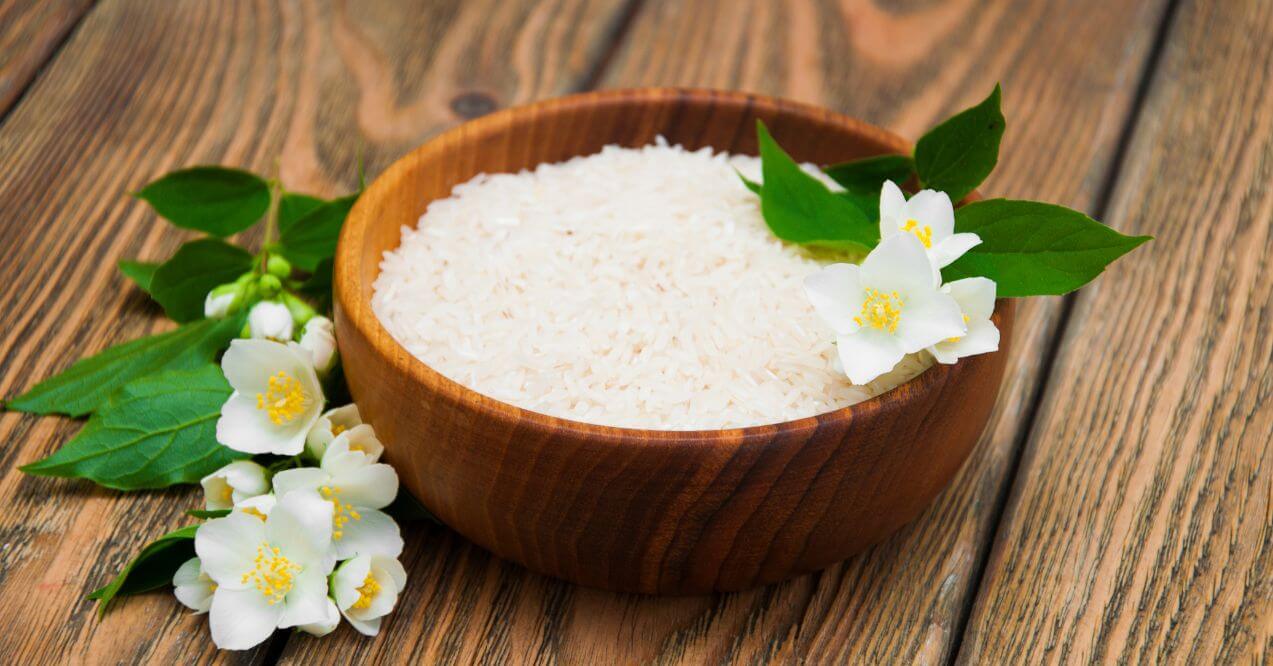
Can dogs have jasmine rice? Yes, jasmine rice is a type of long-grain white rice known for its distinct aroma and slightly softer texture. While the aromatic compounds in jasmine rice are unique, they don’t negatively impact dogs, and in fact, some dogs may find the scent and texture more palatable.
Nutritionally, jasmine rice is similar to other white rice varieties, providing a good source of carbohydrates for energy. However, it has a slightly lower glycemic index than traditional white rice, which may help provide a more gradual release of energy. This can be beneficial for dogs that require sustained energy, such as those with moderate activity levels.
There is a common misconception that jasmine rice is vastly different from other rice types for dogs, but the differences are relatively minor. Is jasmine rice okay for dogs? Yes, it’s safe and can be a tasty alternative, especially for dogs who may prefer the texture and flavor. Just like any rice, it should be served plain and cooked thoroughly.
Portion Sizes and Feeding Frequency
When feeding rice to dogs, portion sizes should be based on their size, age, and activity level. For small dogs, 1 to 2 tablespoons of cooked rice per meal is sufficient. Medium to large dogs can have ¼ to ½ cup of rice, depending on their needs. Rice should not make up more than 10% of a dog’s daily diet, ensuring balance with proteins and fats. It can be fed 2-3 times a week.
A sample plan could include ¼ cup of rice, ½ cup of lean protein, and a small serving of steamed vegetables for a medium-sized dog. Be sure to adjust portions according to your dog’s individual needs and activity levels.
Considerations When Feeding Rice to Dogs

Since we now know the answer to the question can dogs eat rice, it’s also important to consider a few precautions. Arsenic levels in rice, particularly in brown rice, can pose a risk if consumed in large amounts over time. To reduce exposure, ensure the rice is thoroughly rinsed and cooked properly, and limit its inclusion in your dog’s diet.
Some dogs may develop allergies or sensitivities to rice, so watch for symptoms like itching or gastrointestinal discomfort. Overfeeding rice can also lead to nutritional imbalances, as it lacks the essential proteins and fats necessary for a well-rounded diet.
For diabetic dogs, the high glycemic index of white rice can cause spikes in blood sugar levels. In such cases, it’s best to feed rice in moderation or choose alternatives depending on your dog’s specific health requirements. Always prioritize a balanced diet to maintain optimal health.
How to Safely Introduce Rice to Your Dog’s Diet
Introducing rice into your dog’s diet should be done gradually to ensure it agrees with their digestive system. Here’s a step-by-step guide to safely incorporate rice:
- Start Small – Begin by offering a small portion, such as 1-2 tablespoons for small dogs, ¼ cup for medium dogs, and up to ½ cup for larger dogs, regardless of the rice type (brown, white, or jasmine).
- Observe Reactions – After introducing rice, monitor your dog for both positive and negative reactions. Signs of positive responses include consistent energy levels, firm stools, and no digestive discomfort. Negative reactions may involve loose stools, gas, or itching, which could indicate a sensitivity or allergy.
- Increase Gradually – If your dog tolerates the initial serving, gradually increase the portion size over a few days, ensuring rice never exceeds 10% of their total diet.
- Monitor Long-Term – Continually assess your dog’s digestion, coat health, and energy levels to ensure the rice is benefiting their overall well-being. Adjust portion sizes or frequency as necessary based on their response.
Conclusion
So, can dogs have rice? Absolutely! Rice can be a safe and beneficial addition to a dog’s diet when served appropriately. It provides essential carbohydrates for energy, along with fiber, vitamins, and minerals that promote overall health. Whether using brown, white, or jasmine rice, it’s important to serve it in moderation and balance it with other nutrients like protein and healthy fats. Monitoring your dog’s reaction to rice is key to ensuring it suits their individual needs. With careful portion control and preparation, rice can complement a well-rounded diet and support your dog’s energy and digestive health.
Yes, rice can cause allergies in some dogs, though it’s uncommon. Symptoms may include itching, digestive upset, or skin irritation. If you notice these signs after feeding rice, consult your vet and consider adjusting your dog’s diet accordingly.
Feeding your dog rice every day in moderation is generally safe, but it shouldn’t exceed 10% of their diet. Balance it with protein, fats, and other nutrients to ensure a well-rounded diet that meets their overall nutritional needs.
Yes, puppies can eat rice in moderation. It provides an easy-to-digest source of energy and supports digestive health. Start with small portions and mix with other balanced nutrients to ensure puppies receive proper nourishment for growth.
Advertisement. This site offers health, wellness, fitness and nutritional information and is designed for educational purposes only. You should not rely on this information as a substitute for, nor does it replace, professional medical advice, diagnosis, or treatment. If you have any concerns or questions about your health, you should always consult with a physician or other health-care professional. Do not disregard, avoid or delay obtaining medical or health related advice from your health-care professional because of something you may have read on this site. The use of any information provided on this site is solely at your own risk.
